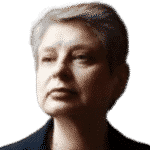In late 1999, as the frail Boris Yeltsin searched for a successor among the ranks of the security services, a bleak joke circulated in Russia. ‘Why are communists better than the KGB?’ went the setup. ‘Because the communists will scold you, but the KGB will hang you.’ It was less a joke than a warning. Unfortunately, most Russians didn’t get it.
That year, Vladimir Putin—a KGB man by now leading its successor agency, the Federal Security Service—was appointed prime minister. Soon after, he allegedly quipped to his former FSB colleagues: ‘The task of infiltrating the highest level of government is accomplished.’ This, too, should have set off alarm bells—not least because Putin had long admired Yuri Andropov, the former KGB chief who had, for two long years, ruled the Soviet Union with an iron fist.
After the economic and political turmoil of the post-Soviet 1990s, people craved stability, and were willing to restore the KGB to the top echelons of government to get it. This gave Putin, who was elected president in 2000, the opening he needed to establish Andropov-style authority over all aspects of the Russian system, not least strategic industries such as oil and gas.
Putin felt threatened by the private moguls who had gained control of those industries during Yeltsin’s chaotic presidency. So, he put the so-called siloviki—affiliates of the military and security services, such as the former KGB agents Igor Sechin and Sergey Chemezov—in charge instead.
Last legs
How did the heirs of organisations that had wrought such terror during Joseph Stalin’s rule in the 1930s and 1940s manage to secure power in the 21st century? After all, following Nikita Khrushchev’s de-Stalinisation of the 1950s and Mikhail Gorbachev’s perestroika in the late 1980s, the KGB had seemed to be on its last legs, even to its own operatives. Many, including Putin, retired during Gorbachev’s rule, thinking the security services would never recover.
That changed after the Soviet Union’s collapse. As it turned out, the KGB was better equipped to navigate the transition to capitalism than any other Soviet institution. Its operatives were amoral, pragmatic, well connected, unfazed by irregular working hours and adept at self-serving manipulation.
It helped that the state security organisations were never disbanded. The KGB not only survived Gorbachev; a version of it—largely defanged and rebranded as the FSB—survived Yeltsin. Russian leaders, liberal or not, have always depended on the security services to maintain their power. What was different under Putin (and under Andropov in Soviet times) was the extent to which representatives of those services wielded power themselves.
For Putin, strengthening the state’s security organs seemed like insurance against upheavals such as those of 1991, which brought the demise of what he calls ‘historical Russia’. And Putin takes great pride in the stability of the political system he has built—a process which was undoubtedly helped along by high energy prices and relatively competent management by some siloviki.
Loyal patriots
But maintaining that system is different from building it. Putin’s approach to governing his creation is embodied in the amendments passed in the sham constitutional referendum of 2020, which not only give him a legal opening to lead for many more years but also define the ideal Russian citizen: a patriot, loyal to the state above all.
This approach has brought with it a shift in the role of the security services in the state apparatus. Putin used to listen to siloviki such as Sechin and Chemezov, and even delegated critical functions to associates. Now, he dictates policy without entertaining alternative views, delegating implementation to government technocrats, led by the robotic prime minister, Mikhail Mishustin. More than ever, day-to-day power is in the hands of security organs, such as the Federal Service for Supervision in Education and Science (Rosobrnadzor), the Federal Penitentiary Service and the Federal Service for Supervision of Communications, Information Technology and Mass Media (Roskomnadzor).
These new pillars of the apparatus of state control are impersonal entities with a singular focus: cleansing the political space of anything anti-Kremlin—now understood as anti-Russian—and punishing those who fail to show sufficient ‘loyalty’. Unlike the siloviki, they do not counsel Putin on how best to tackle the challenges Russia faces or recognise the importance of international engagement for Russia’s internal development. Instead, they blindly pursue Putin’s goal of securing total control over Russia at all costs.
Final repudiation
Alexei Navalny, the imprisoned anti-corruption lawyer and opposition leader, believes that the Kremlin’s primary goal in invading Ukraine was to distract Russians from declining living standards and trigger a rally-around-the-flag effect. More fundamentally, however, the war amounts to a final repudiation of the FSB figures who gained power during Putin’s early years and confirmation of the dominance of Russia’s nameless security technocrats—the real heirs to the KGB. Putin, of course, remains at the top; the new system requires as much.
The chilling implications of this shift are currently on display across Russia. Since Putin launched his ‘special military operation’ in Ukraine, more than 15,000 anti-war protesters, including more than 400 minors, have been detained. Independent media outlets have been blocked or disbanded, with foreign media having little choice but to leave the country. Sharing anything other than the official Ministry of Defence war narrative is punishable by up to 15 years in prison.
In this atmosphere of total repression—now likened to the Stalin era—Russians who have not fled are falling in line. Some 80 per cent of Russians now report that they support the ‘operation’ in Ukraine. That is not surprising. The faceless hangman reigns again in Russia.
Republication forbidden—copyright Project Syndicate 2022, ‘The origins of Putin’s totalitarianism’
Nina L Khrushcheva is professor of international affairs at the New School in New York and co-author of In Putin’s Footsteps: Searching for the Soul of an Empire Across Russia’s Eleven Time Zones (St Martin's Press).

